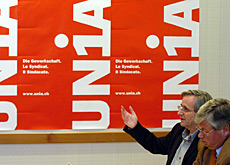Union demands introduction of minimum salaries

Switzerland's largest trade union, Unia, has called for a minimum wage of SFr3,500 ($2,886.5) a month, warning that workers earning anything less live precariously.
Union representatives said in Bern on Tuesday that at a time when companies were making record profits and bosses were smiling, employees had received little recognition of their contribution to the success.
According to a study carried out by Geneva University, around 670,000 full-time employees, most of them women, were paid less than SFr4,000 per month.
The union said that these workers were facing financial difficulties because of their low wages and swelling the ranks of the so-called working poor, needing social benefits to get by.
Ahead of a new round of salary negotiations, Unia reckons there is no reason to justify this situation. It said that the increases in profits recorded by major Swiss companies owed much to employees, whose productivity grew by 1.7 per cent, while salaries only increased by 0.6 per cent
“This means that employers benefited the most from this situation,” said Unia co-president Renzo Ambrosetti.
Widening gap
The union added that the gap between the lowest and highest salaries continued to widen. Top managers earned 15 per cent more last year, and over the past two years the salary gap has increased by 29 per cent.
According to Unia, a person with the minimum salary would have to work 67 years to earn the annual wage of a top manager.
Andreas Rieger, Unia’s other co-president called this situation a “rip-off”. Around 80,000 employees are earning less than SFr3,000 per month, and 300,000 less than SFr3,500.
“With this kind of salary, people are living close to the poverty line,” Rieger added.
The union is calling for minimal salaries to be a part of future collective bargaining agreements. It is also demanding immediate action in some economic sectors to ensure that wage packets are at least SFr3,000, a figure to be raised to SFr3,500 later on.
Labour legislation
For professions where there is no bargaining agreement, Unia wants a minimum salary of SFr20 per hour to be written into Switzerland’s labour legislation.
The union says the actual cost of ensuring at least SFr3,000 for all workers would not be very high, the equivalent of annual salaries of the heads of some of Switzerland’s biggest companies.
Thomas Daum, director of the Swiss Employers’ Association, said he was opposed to a legislative solution, preferring agreements within economic sectors.
Politically, the idea of a minimum wage has not been popular. Only last week, the House of Representatives rejected a proposal that would set it at SFr3,500 and impose an upper limit on top managers’ salaries.
The right and centre-right defeated the idea, claiming that is was not for legislators to impose a solution, but for companies to reach an adequate agreement with their social partners.
As to managers’ salaries, the House said that it was up to shareholders to rein them in and not the state.
swissinfo with agencies

More
Collective labour contracts
Variations of the average Swiss salary in real terms:
2000: – 0,3%
2001: + 1,5%
2002: + 1,1%
2003: + 0,8%
2004: + 0,1%
2005: – 0,2%
According to the Ethos Foundation, the average pay in 2005 of executive directors and executive management in Switzerland’s 100 biggest companies amounted to SFr2.2 million per person and the average pay of non executive directors to SFr230,000 per person.
In Switzerland, the board of directors decides the remuneration of board members and executive management.
But few companies pay their executive management in cash alone. Most also grant shares as well as stock options. On average, executive directors and executive management earned 42% of their pay in shares or options in 2005, while the percentage was 30% for non executive directors.

In compliance with the JTI standards
More: SWI swissinfo.ch certified by the Journalism Trust Initiative











You can find an overview of ongoing debates with our journalists here . Please join us!
If you want to start a conversation about a topic raised in this article or want to report factual errors, email us at english@swissinfo.ch.